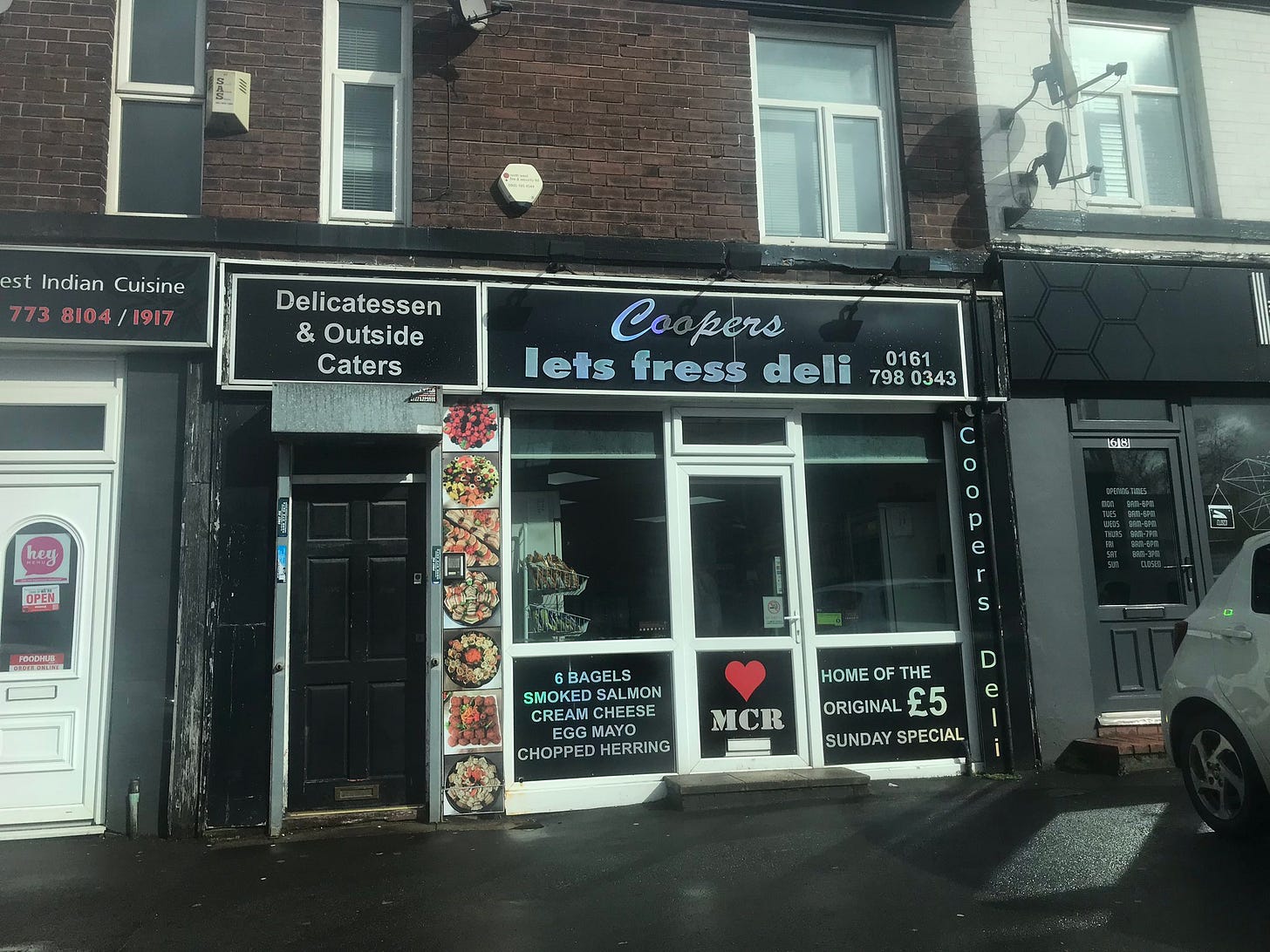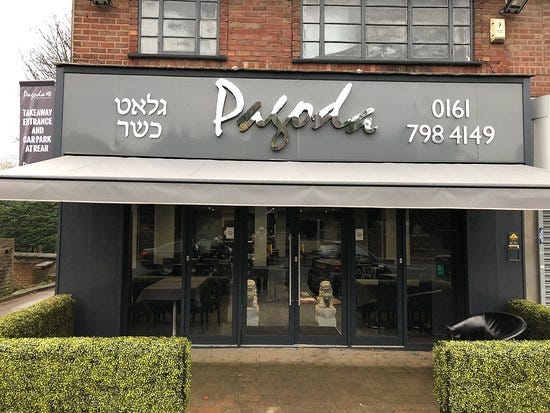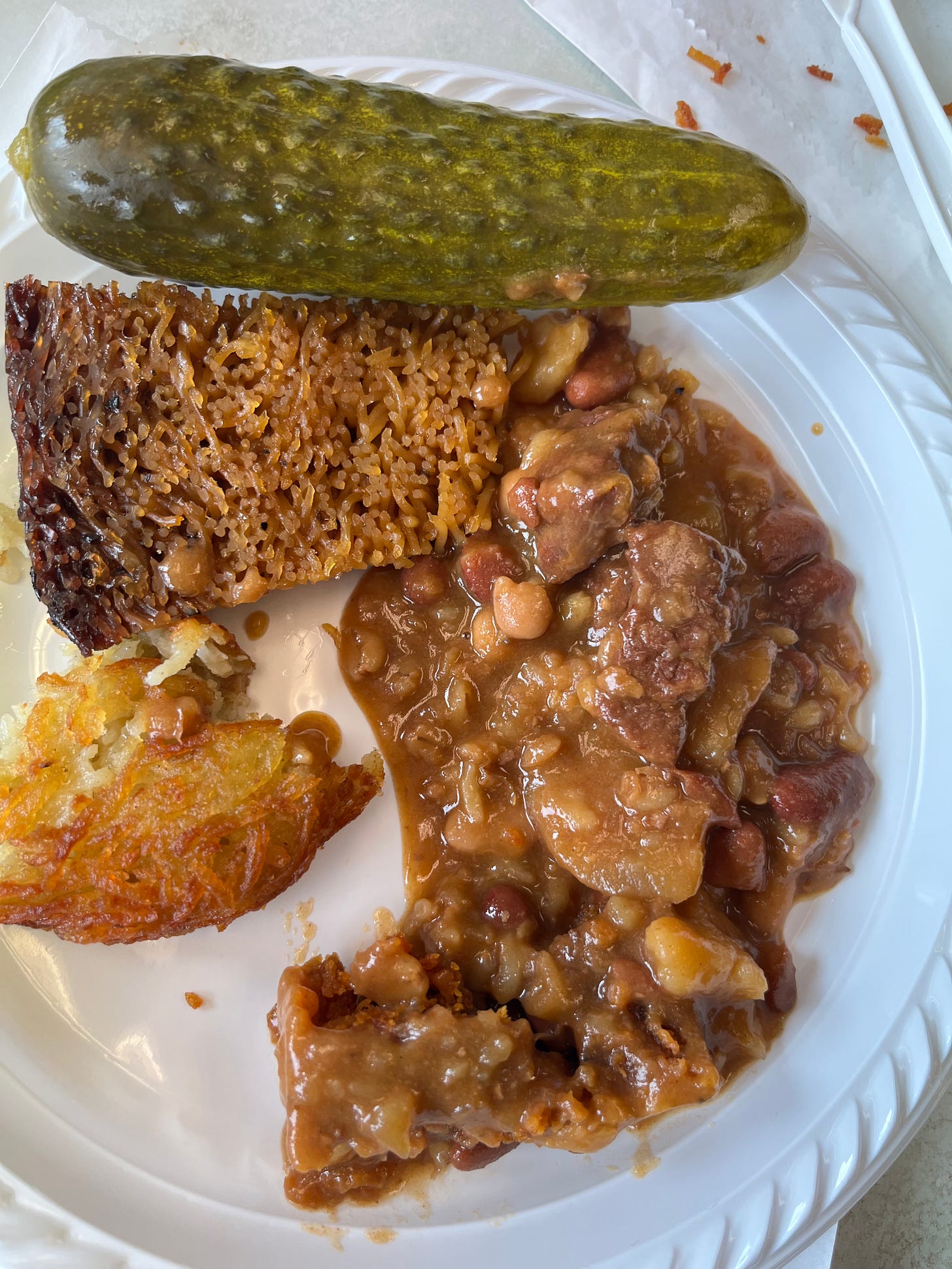Where Has All the Tchulent Gone?
The changing tastes of orthodox Jewish Manchester. Words by Atar Hadari.
This article is a part of Vittles British Jewish Food Week. To read the rest of the essays and guides in the project, please subscribe below:
Where Has All the Tchulent Gone? by Atar Hadari
The changing tastes of orthodox Jewish Manchester
When I first moved to Manchester so my wife could go to music college, we rented a tiny little flat up on Bury Old Road in Whitefield, just round the corner from a deli called Let’s Fress. In the twenty years since I moved from London, Let’s Fress has been one of the few kosher food landmarks that has remained open in this part of north Manchester. Back then, Let’s Fress (fress being Yiddish for ‘over-eat’) was ‘kosher but unsupervised’ due to some bust-up with the kosher authorities, but still provided bagels, cream cheese, fried fish, schnitzel along with a flagship Sabbath meal deal of a roast chicken, chicken soup, chopped liver or egg and onion, roast potatoes and tzimmes for a single tenner. By comparison, Marks & Spencer was then offering a similar deal including a bottle of wine for the same tenner to the much larger non-kosher market. Soon they dropped the bottle of wine, then the side dishes, then the tenner.
The deli’s owner Marc Cooper told me that they had been managing to sustain that Sabbath meal offer at a tenner a head (rather than a tenner for the whole thing) up until the pandemic in 2020. But when lockdown came and the Cooper actually had a chance to do the figures, he realised that there was no profit in it. You can buy your chicken breast, your chicken soup, even your tchulent (or cholent) and make whatever Sabbath meal you like, but it will never come to less than a tenner. But the change Cooper was negotiating is deeper than price. Not only has the cost of meat and supervision made such meal deals not viable, the community has contracted and changed its tastes. Jewish food here once meant tchulent and Sabbath chicken meal deals. But it is another special – the chicken tagine for two at £16 – that is an indicator of where Manchester’s new kosher diner is coming from.
Shortly after I moved, I had to adjust to a rather dourer and more conformist Orthodox community up north than I was used to in London. They liked their kosher food but they didn’t like frills; Chinese food was as experimental as they got. One of the most popular community spots, just up the road from Let’s Fress, was a kosher Chinese restaurant called Pagoda. Pagoda enjoyed the relatively lower rents up near Besses o’ th’ Barn which allowed it to spread itself across two shop-fronts – a takeaway entrance and an adjacent spacious dining room with a good twenty tables and a huge aquarium full of golden and orange tropical fish, lit picturesquely by the sun through the wall-length windows and Venetian blinds. Many an accountant could be found there with their colleague or client at lunchtime, where the restaurant’s emptiness gave them room to talk in relative privacy.
A couple of years ago the landlord made Pagoda an offer they not only could refuse but, in fact, did balk at, and owner Daniel Clayhills decided that he might as well be where most of his punters were and move down into Prestwich (the heart of the Mancunian Jewish community), where he now occupies a much smaller but undeniably busier dining room. He sells a lot of sushi takeaway at what is now Pagoda Chinese Cuisine Grill and Sushi Bar.
The way we eat often evolves not because of one restaurant or takeaway coming or going out of business, but about bigger changes. Some might say that this shift is primarily down to economics. Take tchulent, for example, the Ashkenazi stew of beans and brisket that used to be as popular as sushi in this part of Manchester. Its appeal is partly that of cheap and cheerful food, but it’s more than just comfort food. Anybody can make a pizza, like the new kosher Tasti Pizza in Salford, but a good crust takes talent, a good sauce takes taste. Similarly, anyone can throw a bit of brisket in a pot with some butter beans, onion, potatoes and barley but if it’s done properly what you taste is time, care taken and a sense of peace. It’s designed to be a dish you can leave in the oven all night if you don’t cook on the Sabbath. It’s a meal that tells you that you are home and don’t have to go anywhere.
Yet when my children go to stay at their schoolfriends’ houses for Sabbath they get fed sushi, not tchulent. And it’s the Modern Orthodox parents buying the kosher sushi. Sushi now occupies the same role Chinese food did twenty years ago, in that it seems a tiny bit more daring and exciting than chicken in cashew nuts and mushroom, in the same way chicken in cashew nuts and mushroom once seemed more daring and exciting than a kosher chicken fillet. Pagoda does not, of course, offer tchulent.
Around the corner from Pagoda on King’s Road you will find Mozzarella, a wood-fired pizza joint that also offers sabich pizza, shakshuka (Moroccan) and Israeli (or as it is known on Hebrew menus, ‘Arabic-style’) salad. No Eastern European food, no tchulent. But it’s the favourite hangout of the girls from all the Jewish schools and the favourite meeting place of their mums. Just beyond them on Bury New Road you will find the boys at Ta’am, a Mediterranean grill whose chips in orange paprika my son is devoted to and will travel all the way into Prestwich to eat with his fingers. You can get a kosher shawarma in (Iraqi) laffa there for £8.99 (which you’ll struggle to match in London) and it illustrates the prevailing trend away from the honest bean, broth and brisket of old.
There are a few holdouts left. Down Bury Old Road on your way into the centre of Manchester you will pass Leicester Road, the true heart of the ultra-Orthodox community where Brackmans Bakery still sits offering bagels, pasta and breakfast to a bustling clientele after many decades of business. A few doors down, you’ll find Dovid’s Deli, a small and steamy hangout of yeshiva boys and assorted waifs and strays, which is one of the few places left that serves affordable tchulent from a huge pot, schnitzel, fried fish and assorted deli items and Sabbath fare. (It had an unofficial kosher supervision by a religious judge who had broken with the Manchester kosher authorities but vouched for them with a piece of paper with his name on it in their window) It is always packed. The place is such a cultural landmark that it featured heavily in a documentary made about the ultra-Orthodox community in Manchester.
Dovid’s is only open on Thursdays (until late) and Fridays (closing at 2pm); but the weekday lunches are not enough to keep them going and only one of the little dining tables is still there. When I ask the guy on the till says he can’t remember when they were open longer. They still sell a small cup of tchulent for £3 but seem unused to providing what they think will feed six and consider whether two silver trays will be enough. Imagine you are a mother of eight in Salford and you want to feed your family. Why on earth would you go out and pay £3 a head to buy ready-made tchulent? You could make tchulent at home and you even might take a stab at making the orange chips yourself. Sushi, however, will always be beyond you, so it can command a higher price.
I now usually buy tchulent to take away at Shefa Mehadrin, a butcher’s shop turned supermarket on Bury New Road just across the street from Mozzarella. The pot at Dovid’s is bigger but I must say I prefer what comes out of the small pot at Shefa. I now have that family of six and if I fill a container with tchulent and they weigh it and only then add the kishke or vegetable sausage on top, I do not pay for the sausage and get it free. Because my daughters insist that, ‘We can’t make tchulent as well as Shefa Mehadrin,’ I have no choice but to buy that tray of tchulent for £18. If it were a bigger family I suspect, like most of the Orthodox Jewish community of Manchester now, I would not bother. Sushi, of course, is a different matter.
There is an alternative narrative to explain all this which has nothing to do with the price but with the social mores of the people. Twenty years ago, Let’s Fress was catering in Whitefield to a middle-class, more secular Jewish clientele who may not have kept strictly kosher but were nostalgic for their grandparents’ Russian and Eastern European Jewish tastes from the late 1800s to 1900s when 30,000 Jews arrived in Manchester. (Entirely different from the community of Reform Jewish wool merchants who founded the Bradford community in the 1820s and wouldn’t have touched tchulent with a barge pole.) That clientele was nostalgic for the food they grew up eating. A schoolfriend of mine, the grandson of a former President of the United Synagogue, had not visited a synagogue in many years but would make pilgrimages to Bloom’s in Golders Green, a great old kosher deli, to eat the food he associated with his grandfather’s home.
That generation is gone. Their children have either married out and no longer keep kosher, eating tchulent for nostalgia, or they became more religious and presumably demanded that Marc Cooper patch up his quarrel with the Manchester kosher authorities and get professional supervision. That generation do keep kosher but they are no longer nostalgic. They want to eat what Modern Orthodox American Jews eat and what Israelis eat. Who cares what they ate in the shtetl? They want their kosher sushi and they want it now.
Read more
Keeping Kosher? - A battle over food, tradition, and autonomy in Stamford Hill
A guide to Jewish food in Manchester - from cholent to amba coronation chicken
Credits
Atar Hadari's most recent collection of poems is 'Gethsemane', a sequence of monologues about Jesus by his Jewish contemporaries published by Shearsman.
Editor’s note: if you want to find out where the cholent has gone in Manchester, please check out The Cholent Connoisseur on Instagram.
Vittles British-Jewish Food Week is edited by Molly Pepper Steemson, with additional editing from Jonathan Nunn and Adam Coghlan, and subediting by Sophie Whitehead and Liz Tray.
All illustrations are by Georgia Turner, a freelance illustrator and neuroscience PhD student from London.










A lovely piece. Not Jewish, but here for the food. It reminds me of the chicken barbecue shop on our local high street in Liverpool, and only getting the roast dinner deal when my mum was in hospital having my brother. She was in hospital again and there was talk of it, but my auntie brought us some food.
Moved to Manchester 6 months and I have Jewish roots via my mum, so I'll be pinning these locations to my Manchester map to explore. Really enjoyed this piece